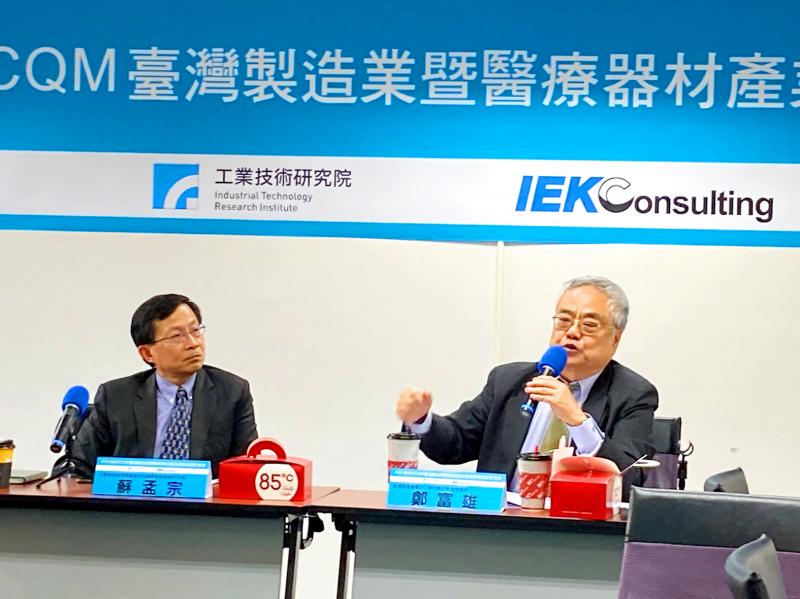The production value of Taiwan’s manufacturing sector is forecast to grow 4.75 percent annually next year, thanks to recovering demand as the global economy reopens after large-scale COVID-19-related lockdowns, Industrial Technology Research Institute (ITRI, 工研院) officials said yesterday.
The rebound would follow an annual contraction of 4.05 percent this year, the institute said.
Production value next year would expand to NT$19.68 trillion (US$678.48 billion) from NT$18.79 trillion this year, the institute said.

Photo: Lisa Wang, Taipei Times
Emerging technologies such as 5G, high-performance computing, artificial intelligence and the Internet of Things would drive the growth, it said.
The distance-learning and work-from-home trends are also stimulating demand for notebook computers and tablets, as well as the electronic components used in those devices, it added.
The institute said that it holds a cautiously optimistic outlook for next year regarding the manufacturing sector, despite uncertainty resulting from upticks in COVID-19 cases worldwide and unresolved technology disputes between the US and China.
“The US and China will continue to trade technology after the US presidential election, as both candidates have pledged to safeguard the interests of the US and its technological leadership,” Stephen Su (蘇孟宗), general director of the institute’s Industry, Science and Technology International Strategy Center (ISTI, 產科國際所), told a news conference in Taipei.
The situation might ease somewhat following the election, as the two nations might seek to resolve their differences via negotiations, Su said, adding that local manufacturers should be aware of realignments in global supply chains.
“The COVID-19 pandemic is the greatest factor affecting the prospects of the manufacturing sector next year,” ISTI senior researcher Patrick Liou (劉名寰) said.
The public health crisis could result in economic fallout and weaken consumer consumption if there are more waves of COVID-19, Liou said.
The information and communications technology industry next year would remain the supporting pillar of Taiwan’s manufacturing sector, he said.
Production value in the industry would increase 3.55 percent year-on-year to NT$8 trillion, up from NT$7.72 trillion this year, he added.
Production value in the semiconductor industry would rise 3.6 percent year-on-year, down from 20.7 percent this year, an ISTI estimate showed.
Production value in the base metals and machinery industries would grow 4.28 percent year-on-year to NT$5.19 trillion, up from NT$4.98 trillion this year, thanks to improving global auto sales.
The industry’s output this year is expected to contract 9.31 percent.
The petrochemical sector would resume annual growth of 9.35 percent to NT$4.05 trillion from NT$3.7 trillion this year.
Production value in the sector this year would fall 18.76 percent, as crude oil prices stabilize, Liou said.
Production value in the livelihood sector, which includes restaurants and tourism-related businesses, would increase 2.5 percent to NT$2.45 trillion, following a decline of 4.8 percent to NT$2.39 trillion this year, on the back of improving consumer confidence and recovering tourism, the institute said.

GROWING OWINGS: While Luxembourg and China swapped the top three spots, the US continued to be the largest exposure for Taiwan for the 41st consecutive quarter The US remained the largest debtor nation to Taiwan’s banking sector for the 41st consecutive quarter at the end of September, after local banks’ exposure to the US market rose more than 2 percent from three months earlier, the central bank said. Exposure to the US increased to US$198.896 billion, up US$4.026 billion, or 2.07 percent, from US$194.87 billion in the previous quarter, data released by the central bank showed on Friday. Of the increase, about US$1.4 billion came from banks’ investments in securitized products and interbank loans in the US, while another US$2.6 billion stemmed from trust assets, including mutual funds,

AI TALENT: No financial details were released about the deal, in which top Groq executives, including its CEO, would join Nvidia to help advance the technology Nvidia Corp has agreed to a licensing deal with artificial intelligence (AI) start-up Groq, furthering its investments in companies connected to the AI boom and gaining the right to add a new type of technology to its products. The world’s largest publicly traded company has paid for the right to use Groq’s technology and is to integrate its chip design into future products. Some of the start-up’s executives are leaving to join Nvidia to help with that effort, the companies said. Groq would continue as an independent company with a new chief executive, it said on Wednesday in a post on its Web

JOINT EFFORTS: MediaTek would partner with Denso to develop custom chips to support the car-part specialist company’s driver-assist systems in an expanding market MediaTek Inc (聯發科), the world’s largest mobile phone chip designer, yesterday said it is working closely with Japan’s Denso Corp to build a custom automotive system-on-chip (SoC) solution tailored for advanced driver-assistance systems and cockpit systems, adding another customer to its new application-specific IC (ASIC) business. This effort merges Denso’s automotive-grade safety expertise and deep vehicle integration with MediaTek’s technologies cultivated through the development of Media- Tek’s Dimensity AX, leveraging efficient, high-performance SoCs and artificial intelligence (AI) capabilities to offer a scalable, production-ready platform for next-generation driver assistance, the company said in a statement yesterday. “Through this collaboration, we are bringing two

Even as the US is embarked on a bitter rivalry with China over the deployment of artificial intelligence (AI), Chinese technology is quietly making inroads into the US market. Despite considerable geopolitical tensions, Chinese open-source AI models are winning over a growing number of programmers and companies in the US. These are different from the closed generative AI models that have become household names — ChatGPT-maker OpenAI or Google’s Gemini — whose inner workings are fiercely protected. In contrast, “open” models offered by many Chinese rivals, from Alibaba (阿里巴巴) to DeepSeek (深度求索), allow programmers to customize parts of the software to suit their